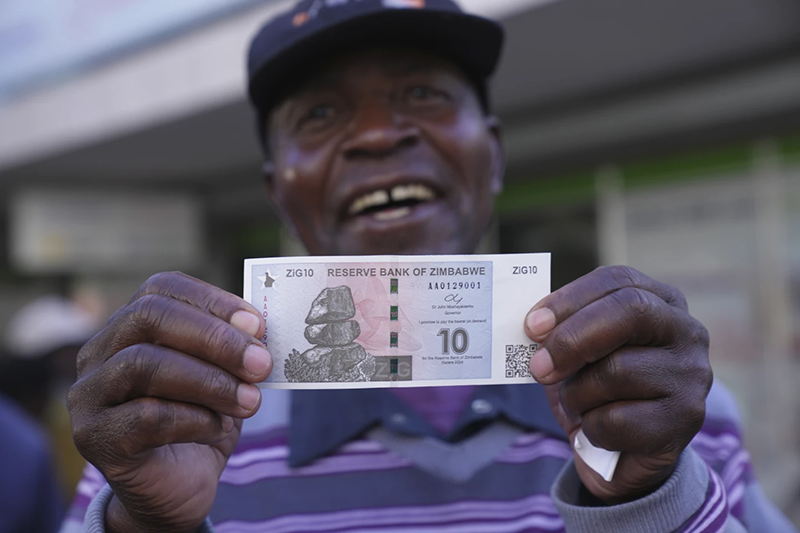- Featured
- No Comment
Zimbabwe shops impose limits amid panic-buying after huge official ZiG devaluation

By News24.com
Some shops across Zimbabwe have imposed “one item per person” rules for products such as milk to fend off panic-buying triggered by a new loss of faith in the country’s latest currency.
Last week, formal retailers warned the government they would go out of business if they were forced to continue selling at the artificially high official rate for Zimbabwe Gold (ZiG) currency. Now retailers such as Pick n Pay, and OK Supermarket have warned they may have to close shops after the shock official devaluation of ZiG.
The latest approach to the currency supposedly backed by physical gold – which hit an all-time high price last week – has further confused consumers, and the broader market.
Last week the official value of ZiG was reduced by 43%. According to Zimpricecheck a retail sector watchdog, “this abrupt change contradicts recent government assurances about the ZiG’s stability and its purported gold backing.”
The Reserve Bank of Zimbabwe’s (RBZ) Financial Intelligence Unit (FIU) blames the exchange rate volatility on illegal money changers.
More than 300 have so far been arraigned before the courts while their accounts were frozen.
One of the most prominent cases is that of Neville Mutsvangwa from one of Zimbabwe’s political aristocratic families.
His mother is the Minister of Women Affairs Monica Mutsvangwa, and his father Christopher sits in the ruling Zanu PF party’s central decision-making body, the politburo, and is also the party’s spokesperson.
Neville faces charges of illegally trading in forex but his parents claim he’s being sacrificed by political rivals within the ruling party.
There’s no sign of flushing the foreign currency traders out of the streets. These are the go-to people despite numerous arrests.
“The same police that are sent to arrest us also need our assistance. Their salaries lost value last week and that has made them more interested in corruption for survival,” said a forex trader on condition of anonymity.
No love for ZiG

Many argue that the government’s new ZiG value is closer to the real rate at which it has long been used everywhere outside government-controlled transactions.h.
Tererai Chamu, a tuckshop owner, said if anyone wanted to know the true economic situation, they should go to the streets instead of listening to government spokespersons or reading the monetary policy.
“We are the true economists here and the government should ask us on the ground why the ZiG is failing,” he said.
When the new central bank governor, John Mushayavanhu came into office early this year, he promised to do things differently from his predecessor, John Mangudya.
“But they are just on the same road,” Chamu said.
He added that when Mangudya introduced the Zimbabwe bond note in 2016, he argued that it had equal value to the American dollar and urged people to use the two currencies alongside each other.
“The bond note drove away good money from the market. Imagine buying goods in American dollars and getting change in bond notes. Soon we started rejecting the bond notes,” he said.
Then Mushayavanhu arrived and said it was a lie that the bond note had the backing of an Afreximbank loan to give it equal value to the American dollar as claimed by his predecessor, Mangudya.
“Then why should we believe the gold backing statement now?,” interjected Sandra Mawire, another trader as she asked for an American dollar change from her counterpart.
Black market crossover
While formal shops are required to accept ZiG, tuck shops and informal vendors simply refuse. As a result, runners now intermediate between some in those two groups, with the informal traders effectively acting as outlets for their bigger peers.
Some retailers switch off their point-of-sale machines to avoid the electronic-only ZiG.
The upheaval has left many people a lot poorer, on paper.
Talent Ncube retired last month and has to wait for three months to get his pension.
When he signed off from work, the money was pegged at 13.9ZiG to the US dollar. Now he worries that the value of his pension could have been eroded by nearly half, but there is no clarity from the government on what will happen to people like him.
“I’m just too stressed to think about it. I might as well leave the country before the money comes. There’s nothing to stay for,” he said.
The Amalgamated Rural Teachers Union of Zimbabwe (Artuz) said it was waiting for President Emmerson Mnangagwa’s State of the Nation Address. They hope that he will “address the devaluation of civil servants’ salaries through currency devaluation”.
They want salaries to be paid hard currency.
